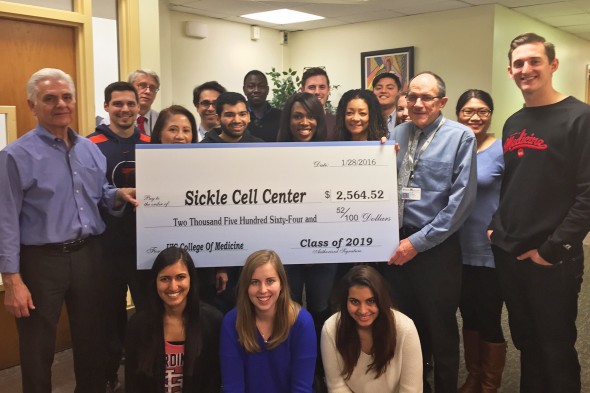Medicine, pharmacy students show support for Sickle Cell Center

Students from the College of Medicine Class of 2019 present their donation for the Sickle Cell Center at the hospital.
Students from the UIC College of Medicine and College of Pharmacy are helping out the Sickle Cell Center at the University of Illinois Hospital & Health Sciences System to recognize its value in the Chicago community.
“We don’t have the opportunity to go to the clinic and save a life because we don’t know enough yet, we don’t have the skills to do that, so contributing, even a small amount for this, is significant for us,” said Ben Vazquez, a first-year medical student in the College of Medicine.
Vazquez and other first-year students organized a charity auction in November, donating half of the proceeds — a total of $2,564 — to the Sickle Cell Center, which provides treatment and support services for patients with sickle cell disease, a disorder of the hemoglobin. The rest of the auction proceeds will go toward the 2019 UIC Match Day celebration, when medical students across the country find out their residency placements.
The donation was made to spotlight the importance of the Acute Care Treatment Center, a branch of the hospital’s sickle cell program that treats patients suffering from chronic pain episodes.
“We’re hoping to raise enough awareness to help the center get money from external donors,” he said.
In the past, the sickle cell program was supported by the Illinois Department of Public Health, but because of state budget uncertainty, the entirety of this year’s “support has not come through,” said Victor Gordeuk, professor of medicine and director of the Sickle Cell Program.
The budget impasse has affected some of the center’s services, such as the Acute Care Center and community outreach program, but the hospital is committed to continuing patient care for sickle cell pain episodes, Gordeuk said.
The hospital plans to relocate the treatment site for sickle cell patients and make it part of a new clinical decision unit, which will function in conjunction with the emergency department later this year. A nurse practitioner specialist will supervise care for sickle cell patients.
“We’re working to make sure that this proceeds with a continuation of the Acute Care Center’s services for patients,” Gordeuk said.
Sickle cell disease is the most common lethal genetic disease in the United States, affecting between 90,000 to 100,000 Americans. But the disease is still “virtually unknown,” said Robert Molokie, a UI Health physician and assistant professor in the College of Medicine.
Sickle cell patients “really need the help,” said Vazquez, who has worked for the center since 2013.
Molokie said he and his colleagues were “ecstatic,” after learning that students would be donating.
“The medical group has done a tremendous amount of things to increase awareness,” Molokie said.
“It’s really exciting to see these students have real compassion for the patients,” Gordeuk added.
External funding can help support treatment developments and research initiatives that the center’s researchers and physicians are involved in, Gordeuk said.
Last year, the center cured 12 adult patients with the disease. Physicians used a stem cell transplant procedure, the first to be performed outside of the National Institutes of Health campus in Maryland, where it was first developed.
Molokie said the students’ donation will improve the quality of life for more than 600 adult and nearly 200 pediatric patients.
“If we can donate, other people can, too,” Vazquez said.
